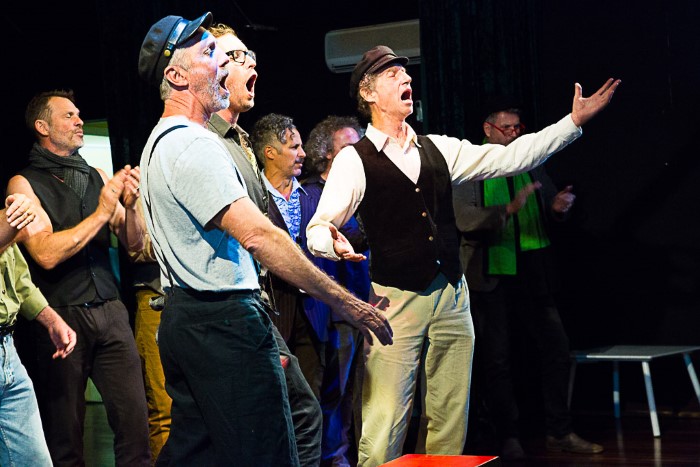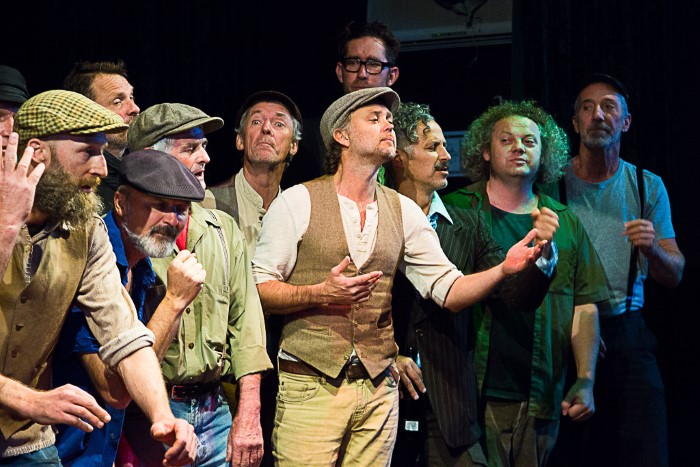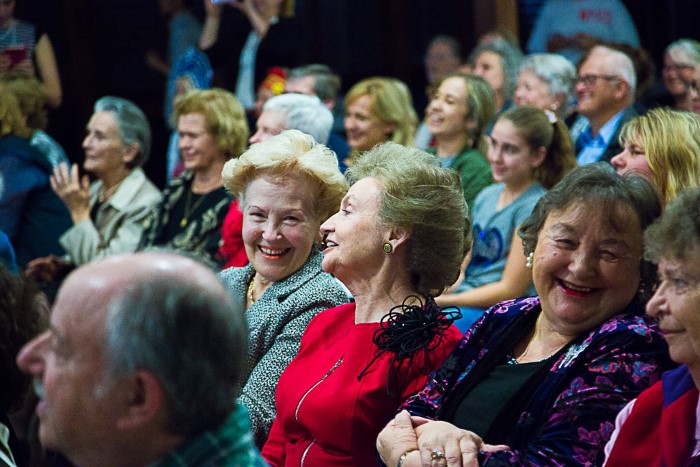
“Passion and Vitality.” Australians Take Russian Songs to Heart
/ Главная / Russkiy Mir Foundation / Publications / “Passion and Vitality.” Australians Take Russian Songs to Heart“Passion and Vitality.” Australians Take Russian Songs to Heart
Natalia Naumova
It was an unusual summer evening last Saturday at the Russian Community Centre in Brisbane. Two hundred people became not just spectators and guests but participants in a long-awaited concert by the male chorus DustyEsky. The chorus is made up primarily of native Australians but they perform Russian songs.
The male chorus DustyEsky—who are famous all across Australia, and have recently become quite well-known in Russia as well—doesn’t fit the classical image of an academic chorus: they don’t wear formal costumes or ties, they don’t stand in even formations or have strained expressions. Very much the opposite. Their total abandon and sense of humor are what differentiate the guys in the DustyEsky chorus from all others. They are true Australians—well-wishing and inviting open conversation. The participants are dressed in their most comfortable clothes, or what they like most, or justever what they happened to see in the closet first. They perform on stage, near the stage, and among the audience. They have sincere smiles on their faces because they feel good right here and now. One unexpected attribute of this chorus’s performances is that just about every other singer was holding a cold bottle of beer—you know, to keep their voices pure and in tune.

[Photo: Anastasia Verchak]
The evening’s program opened with a performance by Gregori Scanlan and Ashleigh Denning, who sang with the accompaniment of Ben and Irene Drozdovskii. The audience heard such compositions as “Katyusha,” “Silver Night,” and “From Russia with Love.”
Next, the DustyEsky chorus took full control of the stage. They seemed to pick up the audience and carry them somewhere outside the center’s walls. In the cheerful atmosphere reigning in the hall during those moments, we felt like intimate friends who understood each other well.
“I’ve had the idea of a male chorus for a long time,” says the chorus director Andrew Swain. “So when my friend, who organizes a musical festival in Mullumbimby, had the idea of bringing over a Russian chorus, the thought came into my head: why don’t we organize such a chorus ourselves out of the local talent? We had three months until the festival began, and only seven people came to the first practice. By the third practice, we had twenty-two. Three months later, we called ourselves DustyEsky and knew three songs: “The Volga Boatman,” “Through Valleys and Over Hills,” and “Monotonous Rings the Bell.” But we really weren’t sure if people would listen to us at the festival—or whether they would like us or think we were crazy.”
To the great joy of the chorus members and organizers, their performance was colossally successful and the audience was moved. What’s more, none of the performers wanted to give up their new occupation after the festival was over. And so, every Tuesday for four years now the DustyEsky guys have got together to sing Russian songs, get together and have a good time.

[Photo: Anastasia Verchak]
As Andrew and Mark Swivel explain, the chorus only puts certain Russian songs in its repertoire. They perform those that exhibit a sense of passion, vitality, strength, and courage—those that were sung by soldiers in the Red Army, as well as Russian folk song that aren’t known to a wide audience.
“At many of our concerts, it’s easy to identify the Russians in the audience: the Russians sing along with us,” say Andrew. “People often come up to us after our shows and tell us that their parents used to sing our songs to them before bed.”
“The guys love singing these songs,” Mark says. “They are well-suited to be performed by men. Sometimes it even seems like the songs themselves are making us sing them.”
The chorus has long dreamed of performing in Russia, ideally during the World Football Championship in 2018. However, in order to make such a grandiose plan a reality, DustyEsky needs adequate aid and support from interested sponsors. As the chorus members told me, the film crew for the SBS television channel has expressed an interest in accompanying the chorus during its upcoming trip across Russia to shoot a documentary.
“It is truly a wonderful surprise that you Russians take pleasure in what we do. We hope that our prospective film and our trip across Russia will help people abroad come to love Russia instead of telling tall tales about it. We would also like to translate “Waltzing Matilda” into Russian in order to perform it for a Russian audience. In this way we can finally put our cultures onto more intimate terms,” says Mark.

[Photo: Anastasia Verchak]
In Brisbane, the DustyEsky chorus had their first concert for a Russian-language audience. This was an audience who knew and loved the songs they were singing. It is no exaggeration to say that the concert was marvelous. The Australian male chorus DustyEsky managed to bring together not only an audience of all ages, but also two distant countries and two historical moments. The two sections of the concert program flew by before we could notice to the sounds of loud applause and shouts of “bravo.”
“We don’t think it would be an exaggeration to say this is one of the few landmark events to take place in our Russian-speaking community!” affirm audience members Dmitrii and Nadezhda Pakhomova. “We have met Australians who are learning Russian and can already speak it well and sing Russian songs. But at this concert we saw an ensemble with a well-rehearsed program—a true collective that has put serious work into their repertoire. In every performance, including the acapella ones, we could hear that soulfulness belonging only to Russian songs and the Russian soul!”
New publications

 Mikhail Kalatozov, a director who transformed the world of cinematography in many ways, was born 120 years ago. He was a Soviet film official and a propagandist. Above all, he was capable of producing movies that struck viewers with their power and poetic language.
Mikhail Kalatozov, a director who transformed the world of cinematography in many ways, was born 120 years ago. He was a Soviet film official and a propagandist. Above all, he was capable of producing movies that struck viewers with their power and poetic language.  Ukrainian authorities have launched a persecution campaign against the canonical Ukrainian Orthodox Church (UOC), the biggest one in the country's modern history. Over the past year, state sanctions were imposed on clergy representatives, searches were conducted in churches, clergymen were arrested, criminal cases were initiated, the activity of the UOC was banned in various regions of the country, and monasteries and churches were seized.
Ukrainian authorities have launched a persecution campaign against the canonical Ukrainian Orthodox Church (UOC), the biggest one in the country's modern history. Over the past year, state sanctions were imposed on clergy representatives, searches were conducted in churches, clergymen were arrested, criminal cases were initiated, the activity of the UOC was banned in various regions of the country, and monasteries and churches were seized.  When Nektary Kotlyaroff, a fourth-generation Russian Australian and founder of the Russian Orthodox Choir in Sydney, first visited Russia, the first person he spoke to was a cab driver at the airport. Having heard that Nektariy's ancestors left Russia more than 100 years ago, the driver was astonished, "How come you haven't forgotten the Russian language?" Nektary Kotlyaroff repeated his answer in an interview with the Russkiy Mir. His affinity to the Orthodox Church (many of his ancestors and relatives were priests) and the traditions of a large Russian family brought from Russia helped him to preserve the Russian language.
When Nektary Kotlyaroff, a fourth-generation Russian Australian and founder of the Russian Orthodox Choir in Sydney, first visited Russia, the first person he spoke to was a cab driver at the airport. Having heard that Nektariy's ancestors left Russia more than 100 years ago, the driver was astonished, "How come you haven't forgotten the Russian language?" Nektary Kotlyaroff repeated his answer in an interview with the Russkiy Mir. His affinity to the Orthodox Church (many of his ancestors and relatives were priests) and the traditions of a large Russian family brought from Russia helped him to preserve the Russian language.

 The leaders of the Friends of the Great Russia cultural association (Amici Della Grande Russia) in Italy believe that the Western policy of abolishing Russian culture in Europe has finally failed. Furthermore, it was doomed to failure from the beginning.
The leaders of the Friends of the Great Russia cultural association (Amici Della Grande Russia) in Italy believe that the Western policy of abolishing Russian culture in Europe has finally failed. Furthermore, it was doomed to failure from the beginning.  Name of Vladimir Nemirovich-Danchenko is inscribed in the history of Russian theater along with Konstantin Stanislavski, the other founding father of the Moscow Art Theater. Nevertheless, Mr. Nemirovich-Danchenko was a renowned writer, playwright, and theater teacher even before their famous meeting in the Slavic Bazaar restaurant. Furthermore, it was Mr. Nemirovich-Danchenko who came up with the idea of establishing a new "people's" theater believing that the theater could become a "department of public education."
Name of Vladimir Nemirovich-Danchenko is inscribed in the history of Russian theater along with Konstantin Stanislavski, the other founding father of the Moscow Art Theater. Nevertheless, Mr. Nemirovich-Danchenko was a renowned writer, playwright, and theater teacher even before their famous meeting in the Slavic Bazaar restaurant. Furthermore, it was Mr. Nemirovich-Danchenko who came up with the idea of establishing a new "people's" theater believing that the theater could become a "department of public education."  "Russia is a thing of which the intellect cannot conceive..." by Fyodor Tyutchev are famous among Russians at least. December marks the 220th anniversary of the poet's birth. Yet, he never considered poetry to be his life's mission and was preoccupied with matters of a global scale. Mr.Tyutchev fought his war focusing on relations between Russia and the West, the origins of mutual misunderstanding, and the origins of Russophobia. When you read his works today, it feels as though he saw things coming in a crystal ball...
"Russia is a thing of which the intellect cannot conceive..." by Fyodor Tyutchev are famous among Russians at least. December marks the 220th anniversary of the poet's birth. Yet, he never considered poetry to be his life's mission and was preoccupied with matters of a global scale. Mr.Tyutchev fought his war focusing on relations between Russia and the West, the origins of mutual misunderstanding, and the origins of Russophobia. When you read his works today, it feels as though he saw things coming in a crystal ball...